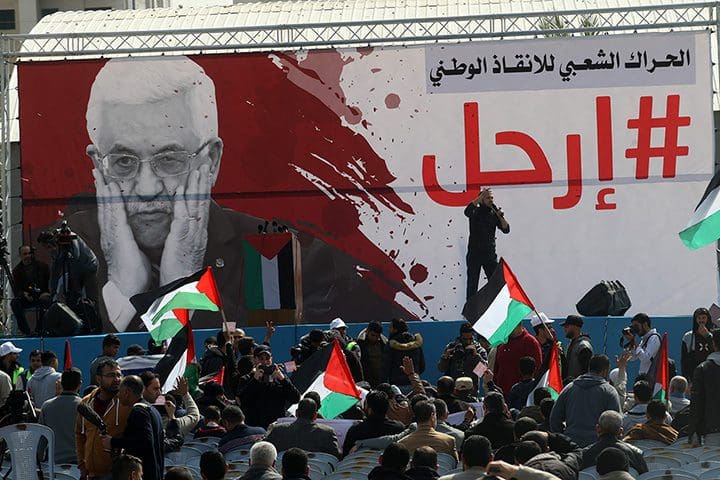In the northern West Bank cities of Jenin and Nablus, Israeli military raids have become a near-nightly occurrence. So far this year, Israeli soldiers have killed more than 80 Palestinians in the West Bank—the most since 2015—and arrested hundreds of others, in what amounts to a far-reaching campaign to crush Palestinian resistance groups that have grown more formidable and assertive in those areas. While the campaign is ostensibly about curbing the operational capacity of armed groups by targeting their fighters at home, there is a corresponding motive that should not be overlooked: to preserve the predominance of the Palestinian Authority (PA) by weakening its rivals.
In recent months, a number of Palestinian factions have mobilized in unified opposition to PA President Mahmoud Abbas and his efforts to alter decision-making processes within the Palestine Liberation Organization (PLO) and to place his righthand man, Hussein al-Sheikh, in a position to succeed him as head of the PLO. Both moves follow several other unilateral and divisive steps taken by Abbas and his inner circle in their effort to monopolize power, including the decision last year to cancel long-delayed legislative and presidential elections.
Israel’s assault on the cities and refugee camps of the northern West Bank are not only targeting members of Hamas and Islamic Jihad, but also resistance fighters from Fatah, Abbas’s own party, who are not loyal to him, as well as many others who are unaffiliated but stand in opposition to the PA. Yet Israel’s military incursions are also a double-edged sword for the PA. The collective punishment imposed and near-daily funerals in Jenin and Nablus further damage the PA’s image, because of its ongoing security coordination with Israel, and increase the risk of disaffection from among its own security personnel. In fact, this week a member of the PA security services was involved in the killing of an Israeli military officer at a checkpoint near Jenin.
With the PA’s hold over parts of the West Bank disintegrating along with its popular support, Israeli military and political leaders are privately sounding the alarm and scrambling to bolster the PA’s ability—and perhaps willingness—to clamp down. In the Israeli newspaper Ha’aretz last week, outgoing military Chief of Staff Aviv Kochavi was quoted expressing concern over “the absence of control on the part of the Palestinian security apparatus in certain parts of [the West Bank],” and the implications for Israeli security. Another government source told the paper, “We’re trying with all the tools at our disposal to help them,” adding that Israel planned on increasing direct financial aid to the PA through various channels. In July, the Israeli HaYom newspaper reported that the Defense and Finance ministries were operating “a secret, extra-budgetary fund” to transfer money to the PA, which was first revealed in court documents.
Israeli concern over the weakness of the PA may sound counterintuitive given how much the authority is denigrated in Israeli public discourse. However, it is a testament to the core function the PA plays in Israel’s overall architecture of control, cooperating on daily security concerns and administering Palestinian population centers on behalf of the occupying power. Indeed, the weakness of the PA is largely a product of this discordant Israeli policy and the erosion of legitimacy that stems from the Israel’s response to the PA’s decline also signals how it is likely to intervene in Palestinian politics in the critical, and potentially explosive, transition period of the coming post-Abbas era.
A Crisis of Legitimacy
At the center of the PA’s troubles is its disintegrating legitimacy among its own public. The PA was established in 1994 as part of the Oslo Accords with the five-year mandate of appropriating governing responsibilities from Israel’s occupation authorities while the Palestine Liberation Organization (PLO) negotiated with Israel over the final status of Palestinian self-government. The PLO entered the process with the understanding that the PA would eventually transition into an independent State of Palestine. As that goal has become increasingly remote, the PA has lost its raison d’être and gradually solidified into an organ of Israel’s permanent control apparatus. Even so, Abbas has shown no sign of altering the PLO’s strategy or goal of statehood, creating a widening rift with a Palestinian public that no longer sees this roadmap as viable.
At the same time, the major Palestinian political institutions have become increasingly authoritarian, corrupt, and repressive under Abbas’s stewardship. Elections for the PA have not been held since 2005-2006; the rupture between Fatah and Hamas in 2007 paralyzed the PA’s legislative process, leaving Abbas to govern by fiat without parliamentary or judicial restraint; and Abbas only convenes the PLO’s national assembly to rubber-stamp his undemocratic decision-making. Even within Fatah—Abbas’s party and the dominant faction of the PA—there is a significant disconnect between the sclerotic leadership at the top and the rank-and-file who have long chaffed underneath it, as well as from disaffected leaders sidelined from Abbas’s inner circle.
According to recent polling, roughly 60 percent of Palestinians in the occupied territories believe the PA has become a burden on the Palestinian people and nearly half would have it dissolved. More than 75 percent of Palestinians want Abbas to resign, while only 1 percent of those in the West Bank say they would vote for his hand-picked successor, al-Sheikh, should elections be held. As this dissatisfaction has grown, the PA has increasingly relied on its repressive security apparatus to stay in power.
The Discord of Israeli Policy
For decades, Israel has sought to establish a compliant and collaborationist governing entity among the Palestinians that would allow it to retain maximum control over the territories and continually expand its colonial project, while divesting itself of responsibility for the Palestinian population living there. In the early years of its occupation, Israel attempted to cultivate local “leaders” willing to cooperate in exchange for privileges under its draconian military regime. In 1976, Israel attempted to give these leaders more credibility by allowing for municipal elections, but they were roundly defeated by candidates with a nationalist agenda and links to the PLO. Two years later, Israel sponsored the creation of the Village Leagues, a network of “moderate,” anti-PLO figures from rural areas outside the urban municipalities, supplying them with financing and arms. The ultimate aim was for the Village League representatives to negotiate with Israel on behalf of Palestinians in the West Bank for “autonomy,” as outlined in the Camp David Accords (which the PLO had opposed). As this project floundered due to a lack of credibility, Israel established the Civil Administration in the early 1980s; but by the end of the decade, Palestinians revolted against that regime, too, in what became known as the First Intifada.
From the Israeli point of view, the establishment of the PA in the 1990s was intended to serve the same essential directive: grant Palestinian self-government but allow Israel to retain control over the occupied territories while relieving itself of responsibility for Palestinians. Thus, Israelis and Palestinians have always had divergent objectives for the institution and its trajectory. Because Palestinians have never bought into Israel’s vision of autonomy, and the PA retained the seed of a sovereign enterprise, Israeli policy toward the PA has been rather schizophrenic, both undermining and relying on the PA. As such, Israel’s defense ministry can simultaneously operate a slush fund for the PA, while the government withholds hundreds of millions of dollars in tax revenue that it collects on the PA’s behalf, using it as a tool of political pressure and extortion.
This form of policy has succeeded in rendering the PA too weak and dependent politically and financially to mount a successful challenge to Israel’s deepening control over Palestinian lands. And the longer the PA has carried on unmoored from its original proto-state mandate, the more it is shaped into a simulacrum of the Israeli ideal: a coopted governing institution without a broader national agenda.
As a result, however, the PA is failing today for the same reason the Village Leagues failed: it no longer has legitimacy in the eyes of its people. While Israel may want to keep the PA in place for its own interests, its efforts to undercut the PA’s nationalist mission eliminate the one thing that gave the PA legitimacy in the first place.
The Limitations of Intervention
The lessons of history are instructive for the coming post-Abbas period in Palestinian politics. The president’s subversion of the democratic process over the past decade has eliminated the PA’s legal process for leadership transition. This paves the way for a messy, and potentially violent, power struggle to ensue both between those who aspire to succeed Abbas from within the PA, and those seeking to supplant it from without. Israel will undoubtedly try and determine the outcome by exploiting divisions and supporting those it believes will serve its interests. Given years of imposed geographic and political fragmentation, this may well result in a sort of Balkanization of the West Bank, with various militias vying for control of their diminutive domains. Yet despite being the most powerful actor on the ground, capable of using its vast coercive power to shape developments, Israel has limits to what it can accomplish. Above all, no amount of intervention can bestow legitimacy, and Palestinians will ultimately reject whoever is not serving their interests.


